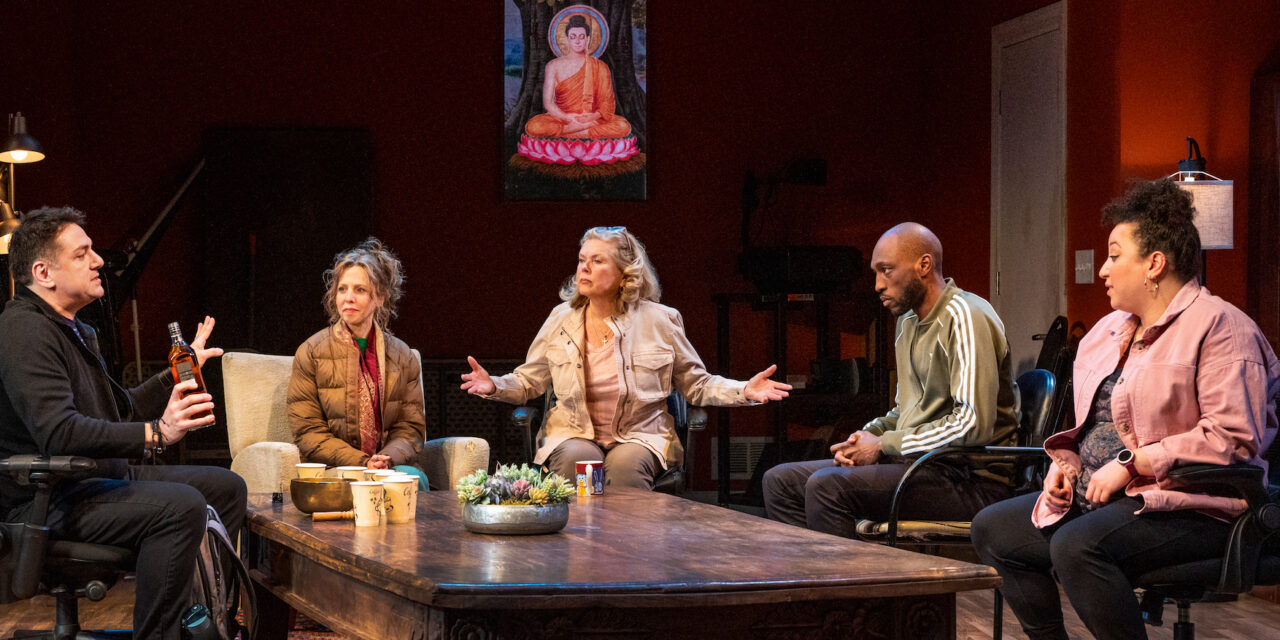By Samuel L. Leiter . . .
Like courtroom dramas, plays about people involved with branches of psychotherapy have a built-in theatrical premise. One or more characters gradually expose traumatic experiences when prodded by interested parties, either professional or lay. The setup, of course, provides ample opportunity for both dramaturgic and histrionic breakthroughs. Such is the case in The Fears, a bumpy new play by Emma Sheanshang on the Irene Diamond Stage at the Pershing Square Signature Center, produced by distinguished filmmaker Steven Soderbergh.
Technically, the play’s premise is not so much psychotherapy as mutual mental and social assistance: a group of trauma victims gathers weekly at a New York center to support one another in an environment influenced by ancient Tibetan Buddhist practices. The sessions are led by Maia (Maddie Corman), a lay practitioner—herself a trauma victim—who first came to the center 26 years ago, and fell under the influence of a leader called Sunam. Sunam, who left recently, never appears but serves as a sort of spiritual avatar until a big reveal arrives.
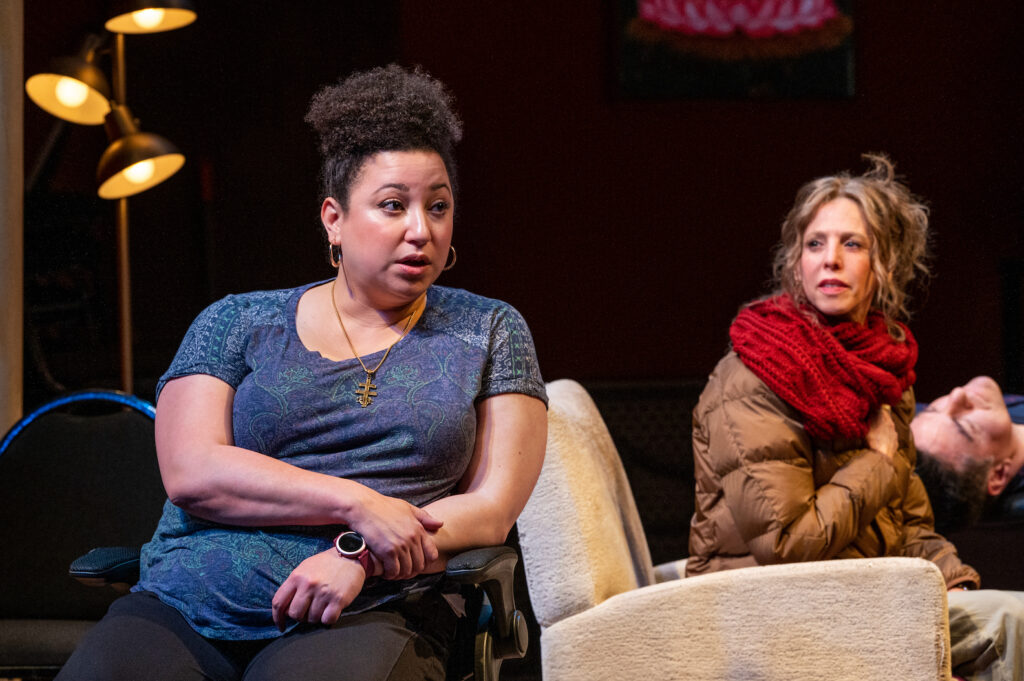
There are seven participants, including the newest, Thea (Kerry Bishé), a beautiful young woman engaged in compiling a timeline of the world’s major historical events. The others, fittingly costumed in everyday wear by David Robinson, are Thea’s boyfriend, the struggling actor Mark (Carl Hendrick Louis); Rosa (Natalie Woolams-Torres), a Latina obsessed with her Fitbit numbers; Katie (Jess Gabor), who affects a Goth look and belongs to a cult called Children of God; Fiz (Mehran Kahgani), a gay man who works at a strip club; and Suzanne (Robyn Peterson), a middle-aged blonde. Over the course of 90 minutes, covering five sessions, each character gets at least one big emotional outpouring.
After removing their shoes at the door, the characters sit in an eclectic mix of chairs around a large coffee table in a large, red room, with a Tibetan-style painting of Buddha on one wall and a mandala on another. Jo Winiarski did the realistic set and Jeff Croiter lit it acceptably. The sessions are usually begun by the quiet, presumably spiritually-centered, Maia. She strikes a gong on a Buddhist “singing bowl” as everyone meditates, no one speaking until the reverberant sound fades away. Then someone will be expected to describe the week that was.
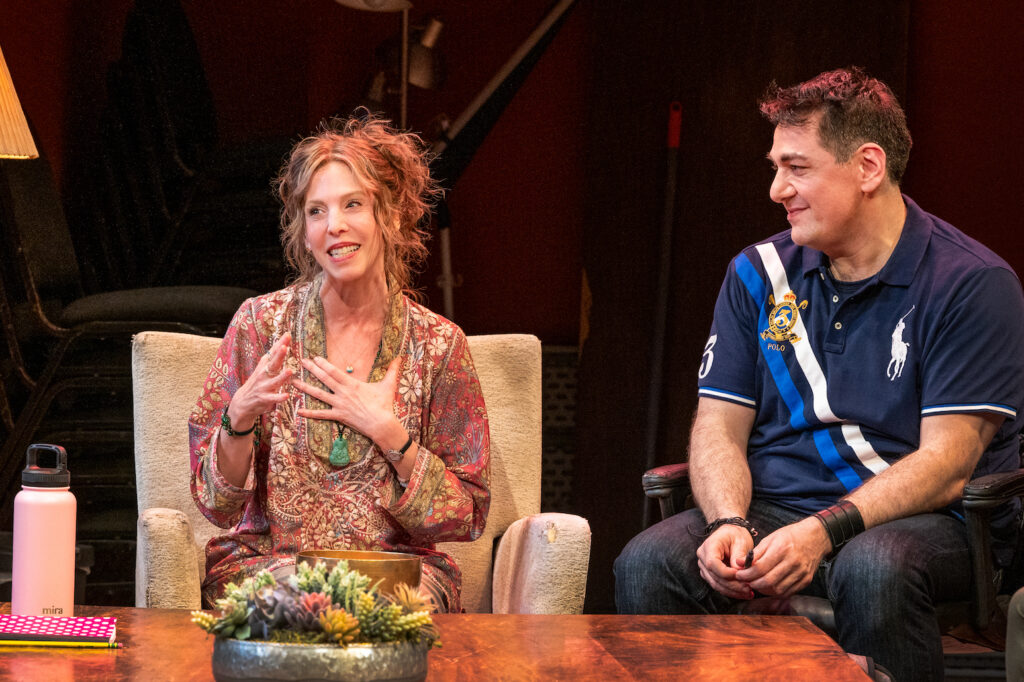

Meanwhile, chaotic sounds of the outside world—arguments, construction work, accidents, etc.—keep intruding through a window, but no one pays them any mind. Other sounds, however, of chatter from those leaving an adjoining room for people 30 and under, provoke snide comments. (Jane Shaw is responsible for the excellent sound design.)
Thea is new to the group, but she never received an email listing the group’s rules, which allows, of course, for useful exposition, since we didn’t get the email either; some rules are meant to keep Mara, god of fear, anger, and death, at bay. Despite its goal of “offering a wing of compassion” for troubled souls—often expressed by trying to envision difficult persons as five-year-olds—the group itself veers from mutual concern to bickering conflict, requiring intercession by others to keep things under control. One source of dissension is the romantic relationship between Mark and Thea, which bends the group’s rules and, when the couple disagrees, leads to Rosa’s claim of “domestic conflict!”
Stressed-out members may be asked if they want to “plant a tree”—TREE being an acronym for the steps required to relax and gain focus. As group leader, Maia responds to commentary with what seems a seemingly noncommittal “Mmm,” the nuances of which Fiz eventually translates; one, for example, hints at her crush on Mark.
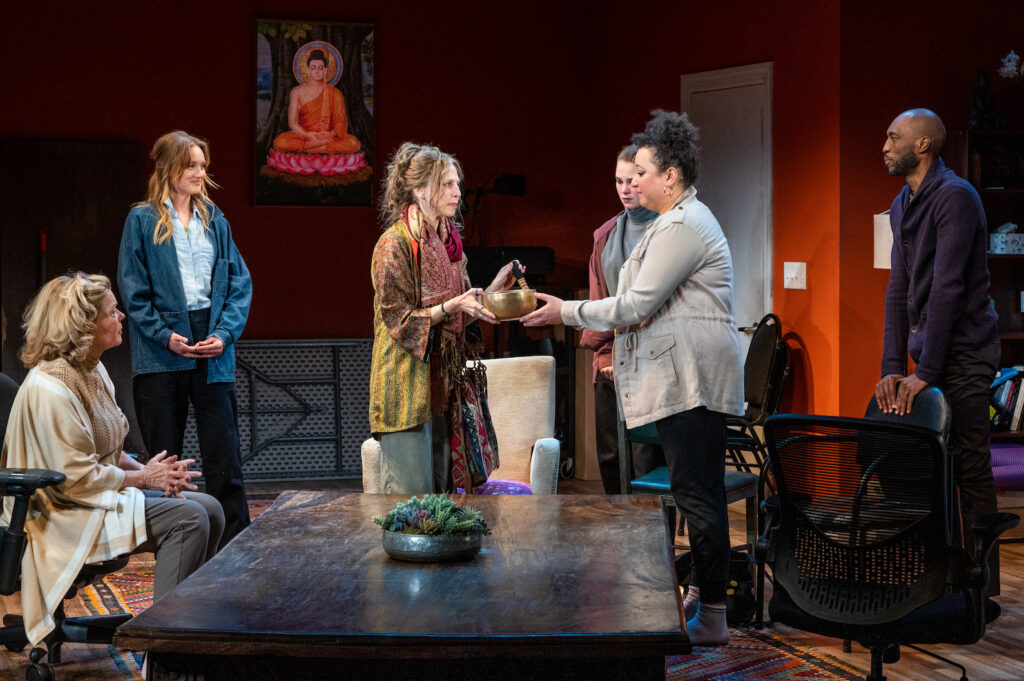

The rules, which also don’t allow sharing of contact information, state that no one is supposed to talk about their traumas, but everyone already knows; and we, too, learn pretty fast what they are. Some are classic, like the story told by one person who was raped by her priest; or the one from the man whose father raped him. At least one character has an episode bordering on mental illness; another is the victim of panic attacks. What’s bothering Thea, who’s been devastated by her historical research, is something of a stretch. Daughter of a woman who died (when Thea was six) in the Pan Am catastrophe over Lockerbie, Scotland, she can’t help but connect it to the horrible things man has done ever since Alexander the Great in 325 BC.
Ideas like this, and the constant squabbling among the group members, too often establish an atmosphere in which it becomes difficult to separate the serious from the satirical. For all its good intentions, The Fears leans so heavily into comedic territory, and its laughs arrive so often, that it seems mainly concerned with poking fun at such groups. If you’re in doubt, just wait for the big pillow fight staged by Tom Schall.
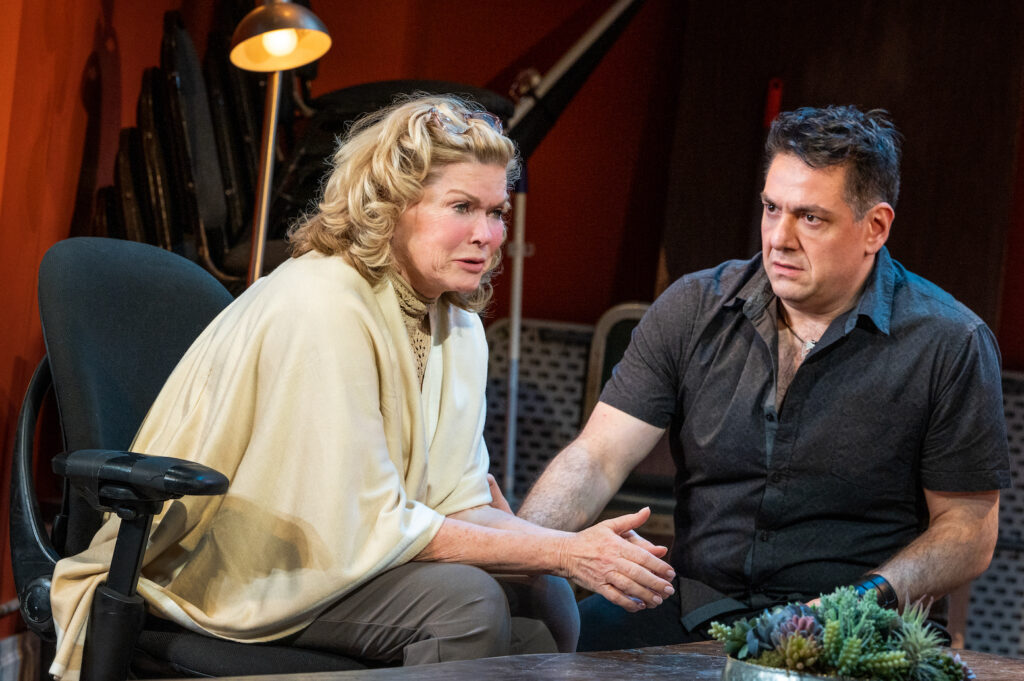

It’s not clear how this group is helping any of its members other than by giving them a weekly destination where they can shed their inhibitions a bit and share their recent experiences; take for example, the character who discloses that she learned during the past week that her father donated so often to a sperm bank she now has over 40 siblings. In other words, therapy has become a social gathering, where you play emotions rather than mahjong.
Dan Algrant’s direction keeps things moving, and the ensemble creates as reasonably believable and well-differentiated a set of characters as Seanshang’s writing allows. But the mildly amusing play itself, while never boring, fails to find a deep enough basis in reality, or a proper balance between seriousness and satire, to be convincing. When the characters gather at the end to seek compassion for suffering mankind, you can’t help but be reminded of all the useless “thoughts and prayers” we hear about following every disaster. At such a moment, you might be forgiven for thinking that the only thing to fear is The Fears itself.
The Fears. Through July 9 at the Pershing Square Signature Center/Irene Diamond Stage (480 West 42nd Street, between Ninth and Tenth Avenues). www.signaturetheatre.org
Photos: Daniel Radar


